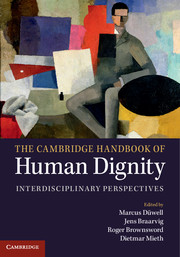Book contents
- Frontmatter
- Contents
- List of contributors
- Foreword
- Why a handbook on human dignity?
- Acknowledgments
- 1 Human dignity from a legal perspective
- 2 Human dignity: concepts, discussions, philosophical perspectives
- Part I Origins of the concept in European history
- Part II Beyond the scope of the European tradition
- Part III Systematic conceptualization
- 19 Social and cultural presuppositions for the use of the concept of human dignity
- 20 Is human dignity the ground of human rights?
- 21 Human dignity: can a historical foundation alone suffice? From Joas’ affirmative genealogy to Kierkegaard's leap of faith
- 22 Kantian perspectives on the rational basis of human dignity
- 23 Kantian dignity: a critique
- 24 Human dignity and human rights in Alan Gewirth's moral philosophy
- 25 Human dignity in the capability approach
- 26 Human dignity in Catholic thought
- 27 Jacques Maritain's personalist conception of human dignity
- 28 Scheler and human dignity
- 29 Dignity and the Other: dignity and the phenomenological tradition
- 30 Dignity, fragility, singularity in Paul Ricœur's ethics
- 31 Human dignity as universal nobility
- 32 Dignity in the ubuntu tradition
- 33 Posthuman dignity
- 34 Dignity as the right to have rights: human dignity in Hannah Arendt
- 35 Individual and collective dignity
- Part IV Legal implementation
- Part V Conflicts and violence
- Part VI Contexts of justice
- Part VII Biology and bioethics
- Appendix 1 Further reading
- Appendix 2 Universal Declaration of Human Rights
- Index
- References
35 - Individual and collective dignity
from Part III - Systematic conceptualization
Published online by Cambridge University Press: 05 March 2015
- Frontmatter
- Contents
- List of contributors
- Foreword
- Why a handbook on human dignity?
- Acknowledgments
- 1 Human dignity from a legal perspective
- 2 Human dignity: concepts, discussions, philosophical perspectives
- Part I Origins of the concept in European history
- Part II Beyond the scope of the European tradition
- Part III Systematic conceptualization
- 19 Social and cultural presuppositions for the use of the concept of human dignity
- 20 Is human dignity the ground of human rights?
- 21 Human dignity: can a historical foundation alone suffice? From Joas’ affirmative genealogy to Kierkegaard's leap of faith
- 22 Kantian perspectives on the rational basis of human dignity
- 23 Kantian dignity: a critique
- 24 Human dignity and human rights in Alan Gewirth's moral philosophy
- 25 Human dignity in the capability approach
- 26 Human dignity in Catholic thought
- 27 Jacques Maritain's personalist conception of human dignity
- 28 Scheler and human dignity
- 29 Dignity and the Other: dignity and the phenomenological tradition
- 30 Dignity, fragility, singularity in Paul Ricœur's ethics
- 31 Human dignity as universal nobility
- 32 Dignity in the ubuntu tradition
- 33 Posthuman dignity
- 34 Dignity as the right to have rights: human dignity in Hannah Arendt
- 35 Individual and collective dignity
- Part IV Legal implementation
- Part V Conflicts and violence
- Part VI Contexts of justice
- Part VII Biology and bioethics
- Appendix 1 Further reading
- Appendix 2 Universal Declaration of Human Rights
- Index
- References
Summary
Is there such a thing as collective dignity? Does it make sense to talk about the dignity of (some of such) entities as the human species as a whole, indigenous peoples, states, religious communities, women, baseball teams or green-eyed men who get up at 7:30? Can we even conceive of dignity as something that could be assigned to collectives? There is no easy answer to these questions, since both parts of the expression ‘collective dignity’ are problematic even before they are combined. Obviously, dignity is a heavily contested, multifaceted and ambiguous concept; moreover, there are different ways to understand the ‘collective’ character of ‘collective dignity’. Nevertheless, one finds a growing number of references to ‘collective dignity’ or ‘collective human dignity’ (for example, De Gaay Fortman 2011; Falk 2009: 58; Howard 1992: 84; International Law Association 2010: 40–3; Mann 2001: 34–6). However, most of them come without any effort to clarify the meaning of these terms. At the same time, the question of whether collective dignity can be warranted seems systematically relevant, at least in the context of certain branches of the human rights discourse. Let us just consider two rather obvious points. The first has to do with the discussion on ‘collective rights’: if one is of the opinion that collective human rights exist and if one, in addition, supposes that dignity is the normative basis or ‘source’ of human rights, it seems reasonable to ask whether collective human rights are also grounded in some form of collective dignity. The second point is related to one strategy of interpreting and vindicating dignity: if one argues that the normative basis of dignity is something like agency and if one, in addition, supposes that not only individuals but also collectives can be agents, it is again an obvious question whether collective dignity exists.
In what follows, I will first mention some of the most prominent uses of the term ‘collective dignity’ (2nd section) and then make some tentative remarks about the extent to which these uses are plausible (3rd section).
- Type
- Chapter
- Information
- The Cambridge Handbook of Human DignityInterdisciplinary Perspectives, pp. 343 - 352Publisher: Cambridge University PressPrint publication year: 2014
References
- 7
- Cited by



